The dreaded “C” word. It seems these days that many environmental factors like the sun, pollution and second-hand smoke can cause cancer. Unfortunately, recent studies have shown that popular foods can also lead to it. Some of these foods are probably in your pantry right now. Read on to find out which foods you should never eat to lower your chances of developing cancer.
1. Refined Sugar
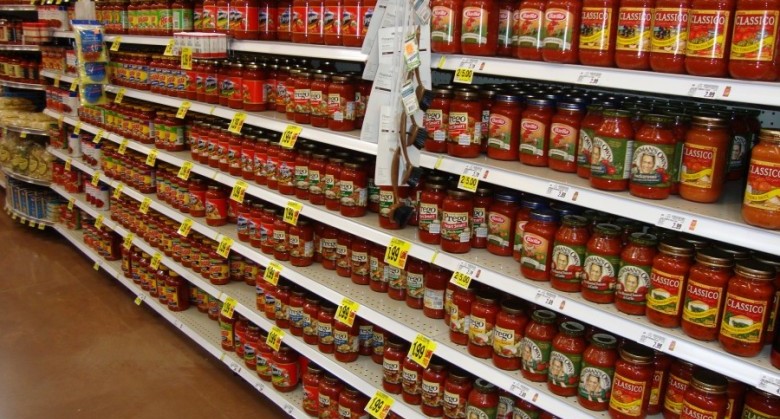
Refined sugar, it’s been affectionately known as “Poison” and “Leach.” It earned the nickname “Poison” because this sweetener is totally and completely bereft of any nutritional value. The pet name “Leach” comes from the vitamins and nutrients it saps from the body in order to be digested. Refined sugar, like the kind you pour in your coffee, eat as sweets, or that’s in store-bought tomato sauce you pour on your spaghetti, has been credited with feeding cancer cells. Now research says refined sugar might actually cause cancer. That ain’t sweet.
2. Soda Pop
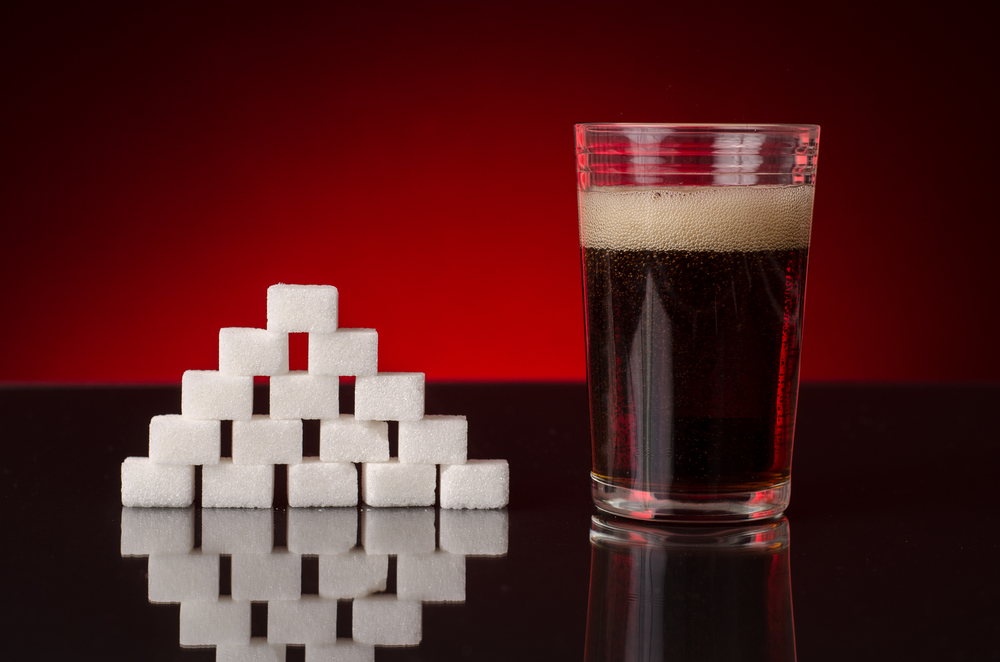
Soda pop might taste good, but that taste is the result of lots of sugar, colors and chemicals that add acid to the body that can spawn the growth of cancer cells. One study linked fructose, a type of sugar used in sodas, with pancreatic cancer. Another study found that the 4-methylimidazole in soda is a potential carcinogen. (4-methylimidazoleis a bi-product of caramel color which is used to turn colas and soft drinks that delicious brown hue.) The study stated that drinking just one can a day routinely could be enough to cause cancer cells to develop. Oh, let’s not forget the sugar, typically in the 40 grams per 12oz can neighborhood. Psst: that’s 10 teaspoons of sugar—in one can of pop! With so many other beverage options, maybe leave soda on the shelf…in the store.
3. Processed Meats
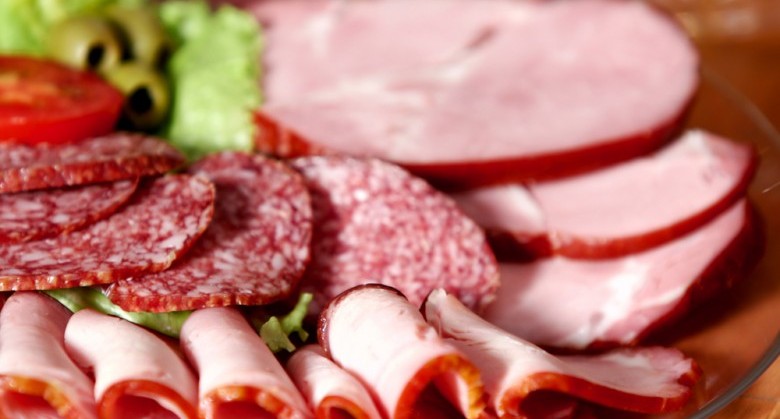
“Get you hot dogs!” That’s the familiar cry heard at ballparks all over, but wait just a minute. Hot dogs are a processed meat—they’ve been treated in some way to preserve their shelf life or to improve their flavor. This “processing” can be done by salting, curing, fermenting, smoking, or preserving in some other way. After reviewing 800 studies, The World Health Organization announced that process meats are a carcinogen (i.e. they can cause cancer). They reported that eating the equivalent of four slices of bacon daily (or eating four slices of bacon daily) raises the risk of getting colorectal cancer by 18 percent. The risk is low but present. Meats that fall into this category are not sold fresh and include ham, turkey, some deli, bacon, sausage and of course, hot dogs.
4. Red Meat
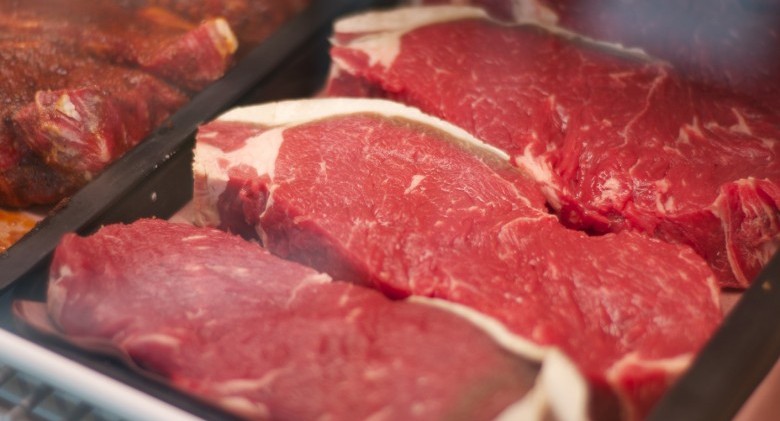
Do you remember the World Health Organization (WHO) from #3? They also looked at red meat studies and concluded that red meat is a “probable” cause of cancer in humans. They found links between eating red meat and colorectal, prosatate and pancreatic cancers. Enjoying small amounts of grass-fed red meat occasionally is very different from eating quantities of red meat daily, and the WHO parks pork in the red meat category.
5. Microwave Popcorn

What could be easier than tossing a bag in the microwave, pressing a button and then voila: delicious popcorn?! Popcorn is a healthy snack offering potassium, iron and fiber. But microwave popcorn comes with some risks, cancer being one. A chemical that lines the microwavable bag decomposes and forms a compound that has been linked to liver and pancreatic cancer. A separate chemical used to flavor the popcorn can cause the lung condition called bronchiolitis obliterans. One way to decrease your chances of developing this is to let the bag of heated popcorn cool before opening it. One way to avoid all the ailments is to use a hot air popper or the stove top to pop your kernels. Remember to go easy on the butter!
6. Dirty Fruit
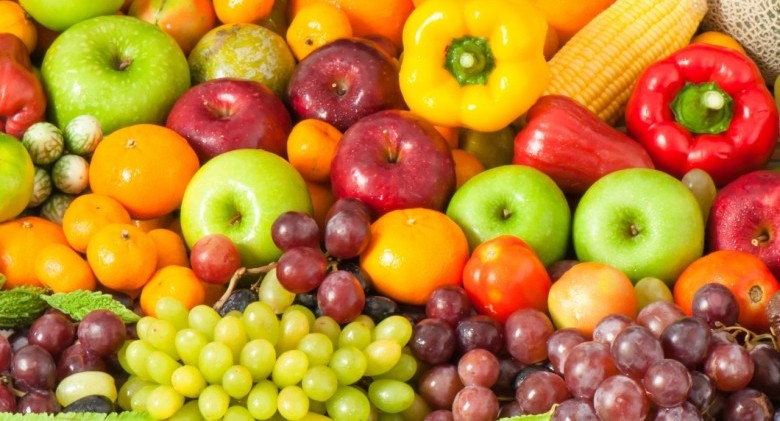
Can we offer you a bowl of delicious pesticides? How about poison in a peel? Actually, the peel is good because it shields the edible fruit from the plethora of pesticides that shower the crops. 165 pesticides to be exact. Some of them have been linked to cancer. In the effort to make fruit unappealing to insects, we make the fruit unhealthy for humans. The bugs might pass because of the pesticides, but then the poisoned fruit winds up in your market and then on your table. Uh-oh. In the Environmental Working Group’s Shopper’s Guide to Pesticides in Produce, apples, peaches, grapes and strawberries made it to the list of the “Dirty Dozen” fruits that contained the highest concentrations of pesticides. Healthy? We think not. Best to spend a little extra on organic. Otherwise, you might pay for it later.
7. Potato Chips
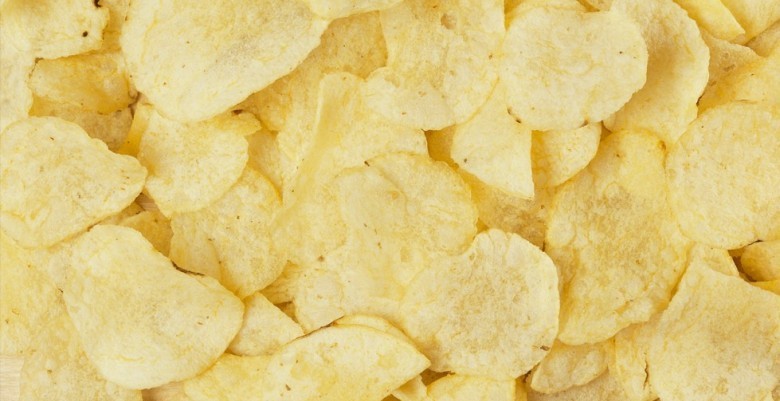
It seems you can’t even kick bag with a bag of chips without biting your nails with worry. Potatoes contain a chemical that’s activated with high-temperature cooking. The chemical, acrylamide, is found in plastics and papermaking as well as in cigarette smoke. Does it cause cancer? In rodents, yes. In humans, probably. The National Toxicology Program and the International Agency for Research on Cancer consider it to be a “probable human carcinogen.” Hmm. Can somebody pass the air-popped popcorn, please?
8. French Fries
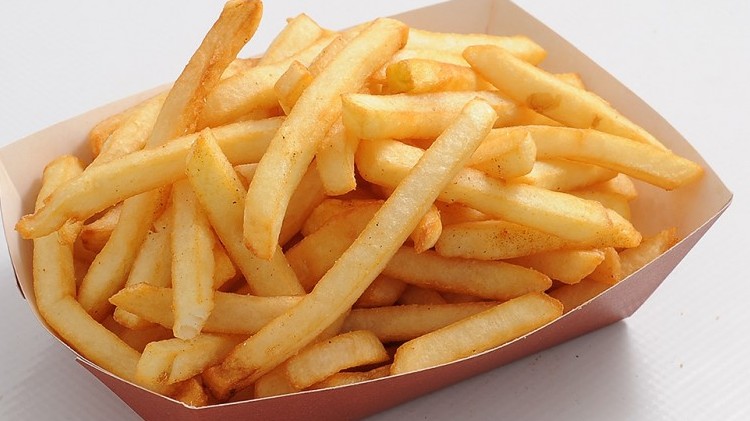
Since French fries are potatoes, and cooking potatoes in high temps activates acrylamide (remember potato chips?), this makes French fries a hazard. It doesn’t stop there. Potatoes are on the Dirty Dozen list of fruits and veggies with because of the high quantity of pesticides they retain. Then there’s the obvious danger: frying. But that’s more a heart-related risk than a cancer risk. So, whew. Go organic and save yourself a lot of potential health problems.
9. Farmed Salmon
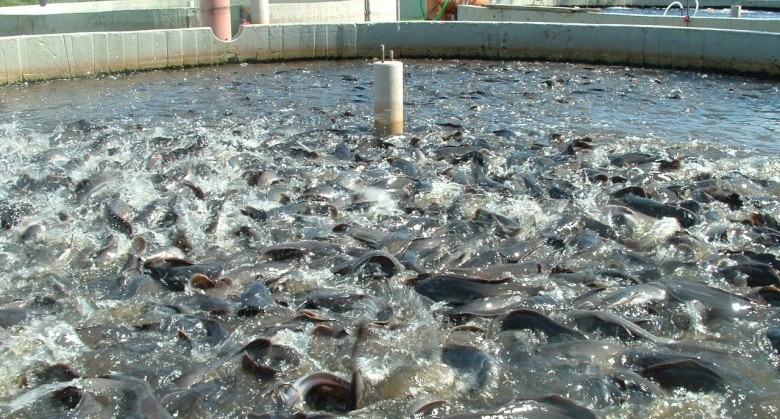
If you enjoy eating salmon for the taste, or you eat it for the omega 3s, choose the canned kind. Farm-raised salmon are overcrowded in order to raise enormous numbers of fish, and that leads to health issues. For one, their color is not what it should be, so they’re fed chemicals to ensure their meat is the reddish-pink hue you’re used to seeing. They’re also treated with antibiotics and pesticides that are well-known carcinogens. Check the label when you’re fishing for salmon in your supermarket. Over 60% of the salmon consumed in the U.S. is from a fish farm.
10. Canned Tomatoes
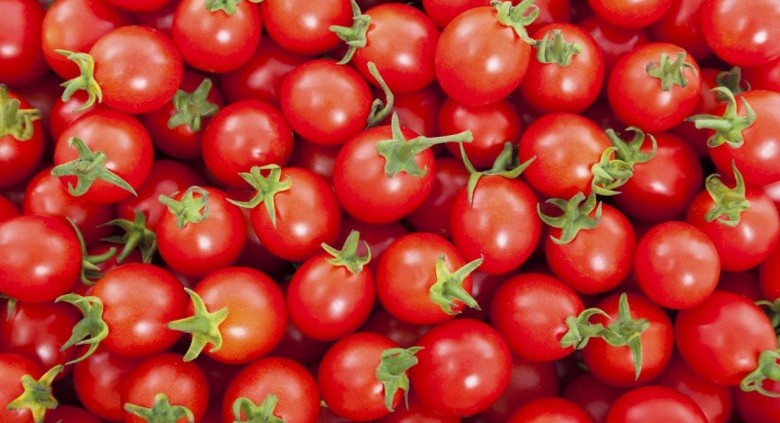
In some countries, the lining in the cans of tomatoes contains a chemical known as bisphenol-A, or BPA. It is toxic, and it lines other canned foods as well. Tomatoes, however, due to their acidity, cause the BPA to leech from the lining of the can and enter the actual tomatoes. Not good. BPA in cans has been linked to several health issues including heart disease, diabetes and cancer. The danger is multiplied when tomatoes are in the can. Glass jars may not solve the problem because the metal lid often has BPA. The safest choice might be to buy fresh, organic tomatoes. Or ask the manager in your market if your canned and jarred tomatoes have BPA.
11. Hydrogenated Oil

Hydrogenated oil is liquid oil that was chemically processed to turn solid. Partially hydrogenated oil, also called trans fat, has become known as the worst fat you can put into your body. Typically, hydrogenated oils are used to preserve processed foods to increase their shelf life. . .by a lot. These oils, when ingested, can alter the structure and integrity of human cell membranes. This can lead to several health issues, one of which is cancer. A study showed that the risk of breast cancer almost doubled among women carrying around high levels of trans fats. Foods to be wary of include baked goods, snack foods, deep-fried foods and some margarines.
12. White Flour

For flour to become white, it has to be refined (which strips it of all nutritional benefits) and then bleached, typically using chlorine gas. If you eat white bread, for example, you are eating bread that is devoid of nutritional benefit, even if nutrients were put back in, called “enriching.” Thus, you’re not getting any disease-protective properties you would get from other foods. Also, white flour is high on the glycemic index which means your blood sugar and insulin levels spike after eating it. There is evidence that the process that ensues may have cancer-promoting effects. There was a study stating that refined carbohydrates were linked to a 220% increase in breast cancer among women. Whole wheat bread might be the better choice for women. . . and for men.
13. Alcohol

It should not be a surprise that drinking too much alcohol can lead to liver poisoning or liver cancer. The International Agency for Research into Cancer (IARC; part of the World Health Organization) has listed alcohol as carcinogen since 1988. And scientists have found that some cancers are more common in heavier drinkers. Mouth, throat, breast and bowels are susceptible to developing cancer as a result of drinking too much alcohol. The type didn’t matter. The quantity consumed over time did matter.
14. Pickles
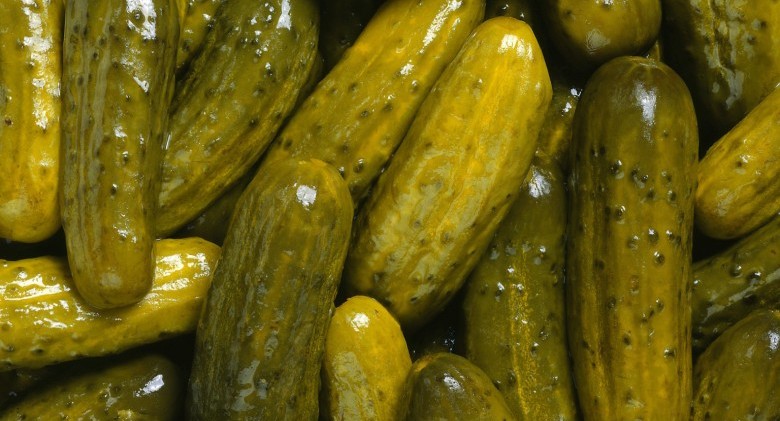
There’s good news, and there’s not-so good news. Pickles, which are cucumbers that underwent the pickling process of fermenting in salt, vinegar and seasoning, contain probiotics. That’s good news. However, they also contain a high amount of sodium, and pickles that are highly salty have been linked to stomach cancer. A team of doctors in Turkey discovered that gastric cancer patients ate a lot more pickles than cancer-free patients. In general, one large standard pickle is more than enough each day.
The final two are believed to cause cancer, but a correlation has not been established linking either to cancer. Prepare to be surprised. . .
15. Genetically Modified Organisms (GMOs)
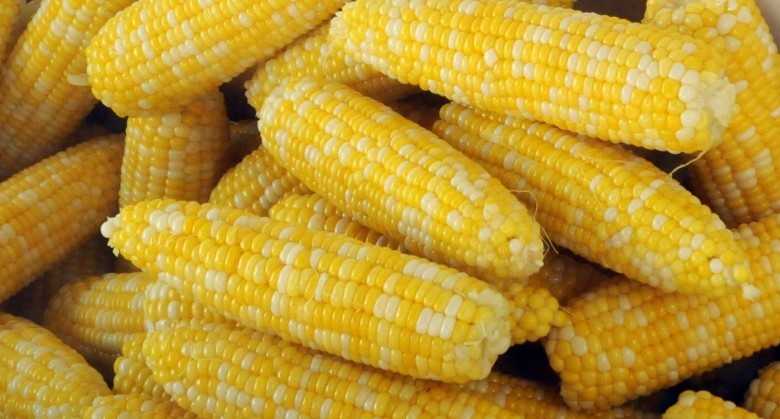
One study (that was later retracted for unknown reasons by the journal that published it) showed a link between genetically modified corn and cancer. Genetically Modified Organisms (GMOs) are living organisms that have had their genetic material artificially manipulated to deliver a benefit. They are becoming more prevalent in markets around the country, and although the health effects of these modified foods on humans have not been conclusively determined, strong sentiment is that they are very harmful over time.
16. Artificial Sweeteners

In the 70s, saccharin studies on rats showed that high doses of the sweetener caused cancer—in rats. It was later proven that the cancer was specific to rats because of their biological make-up, and high doses of saccharin led to bladder stones and bladder cancer. Aspartame is another popular artificial sweetener. In the 90s, a report linked an increase in brain tumors to the powder. However, according the the Cancer Council NSW’s website, upon further investigation, this link was found to be no link at all, just coincidental. Then, in 2005, a study showed that rats that ingested aspartame developed lymphoma and leukemia. However, the rats ingested the equivalent of between eight and 2, 083 cans of diet soda a day! But the damage was done and the public accepted the notion that artificial sweeteners lead to cancer, even though expert agencies in the U.S. (like the National Cancer Institute and the Mayo Clinic) and elsewhere say it’s safe for use.
[Featured image credit: www.gbtimes.com]
